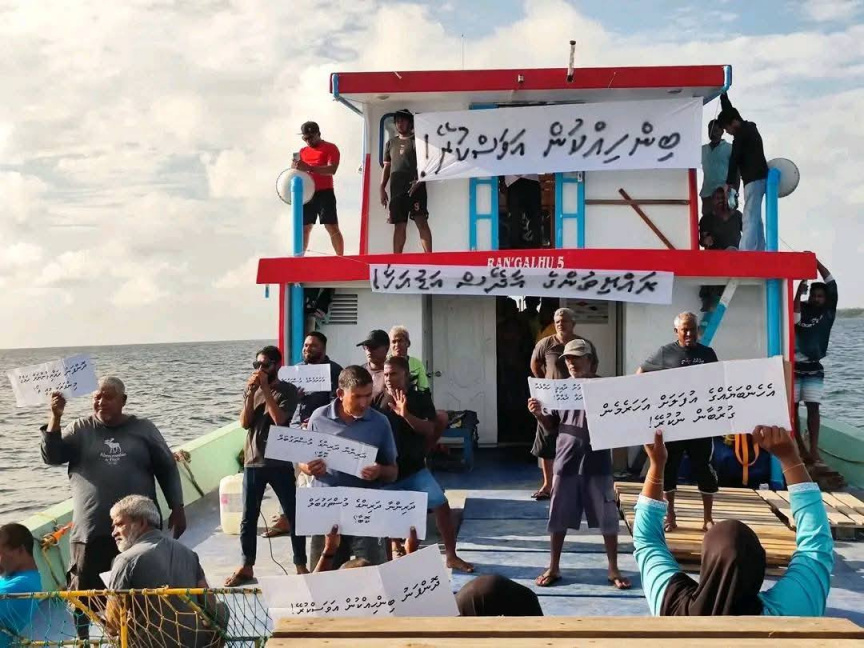
Residents of B. Dhonfanu protest against the decision to drop a land reclamation project in the island on September 12, 2025. (Photo/Facebook/Ibrerhim Najetzz)
Residents of B. Dhonfanu took to the sea on Friday, as they protest against the decision by President Dr. Mohamed Muizzu to drop a project to reclaim land in the island over widespread concerns over the potential damage to Hanifaru Bay, a UNESCO biosphere reserve that lies nearby.
On August 13, Maldives Transport and Contracting Company (MTCC) was awarded a contract to reclaim 13 hectares of land in Dhonfanu, a small island with a population of some 400 people. The agreement was signed during President Muizzu’s visit to the island, and drew criticism from environmental advocates over its implications for Hanifaru Bay, which is among the most important marine habitats in the Maldives.
But on Tuesday, President Muizzu announced he was scrapping the project in light of public concern over its potential environmental implications.
The decision met with protest from the residents of Dhonfanu, who have been holding serial demonstrations since. They expanded their protest on Friday, riding boats out into the sea holding up banners and highlighting their desire to expand the size of the island.
Ahmed Irushad, the president of Dhonfanu Council, told Sun on Friday afternoon that the peaceful protests at sea will continue until the government changes its decision.
He said the protest will be carried out within the 700-meter area from the island’s house reef that lies within the council’s jurisdiction.

Irushad said that the residents of Dhonfanu do not want to harm any location in B. Atoll, including the Hanifaru Bay.
But he said that the residents of a couple of other islands in the atoll have come out to harass the demonstrators.
“Some people have been coming to this area and engaging in acts of harassment. We explained that we weren’t demonstrating because we had any issue with any of them. But that this demonstration is to convey to the President what we feel about his decision,” he said.
Dhonfanu Council on Thursday announced a ban on snorkeling and diving at the island’s house reef during the protest. But the Local Government Authority (LGA) announced that the decision was illegal and ordered for the ban to be lifted.
When questioned about this, Irushad told Sun that the LGA has not formally instructed the Dhonfanu Council to lift the ban. He said that he learnt of it from a news article.
Housing Minister Dr. Abdulla Muthalib has said that while the land reclamation project has been dropped, the government will be running a harbor development and coastal protection project in Dhonfanu.

Hanifaru Bay is recognized as one of the most important marine habitats in the Maldives, serving as a critical feeding and breeding ground for several vulnerable and endangered species, including whale sharks, reef manta rays, napoleon wrasse, as well as protected marine turtles.
The commencement of reclamation works in Dhonfanu had sparked a petition on Change.org, calling for an immediate halt to dredging operations, stressing that Hanifaru Bay is crucial feeding and mating ground for endangered species, and warning that the potential threat from the project is not solely environmental but extends to economic and cultural dimensions.
Concerns outlined in the petition included the risk of sedimentation caused by dredging, which could disrupt the marine water cycle and endanger plankton populations, the microscopic organisms that form the foundation of the food chain for reefs and larger marine life, the decline of which could have widespread consequences for the ecosystem.
The petitioners warned that the project poses a threat not only to the survival of individual species but also to the future of the island communities whose existence is deeply tied to the sea.